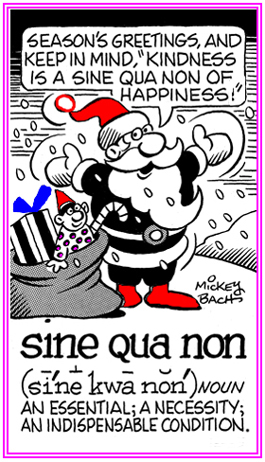2. A defined set of signals or gestures used for communication by individuals who are unable to hear properly: "He used his hands to make signs to his friends that it was time to go to the ball game."
3. One of two characters (+, -) used to indicate positive or negative factors in mathematics: "The student missed one question on the math examination because she forgot to put the correct sign in the answer."
4. A poster or bill board typically used for advertising or providing information: "The directions said to turn right at the sign pointing to the bridge."
"We noticed that our neighbor had a For Sale sign on his car."
It was a sign that she would not be much of a mathematician when she couldn't figure out what the sine was on the geometry question in the quiz.
When an agreement stands or falls on the inclusion of a particular condition, that condition may be called a conditio sine qua non, literally "a condition without which not".
A legal term.
Motto of the Brooklyn College (City University of New York), Brooklyn, New York, USA. It is also translated as, "Nothing without great toil."
Another translation includes: "Nothing without the Deity (or Providence)". Motto of the State of Colorado, USA; and Regis College, Denver, Colorado, USA.
Another translation: "You have to keep at it." A reference by Pliny to the Greek painter, Apelles, who apparently was steadfast in practicing his art.
If a law didn't exist before a specific action was committed, one can't be sentenced to prison for that activity.
Without the [year] date of publication.
In parliamentary procedure, without appointing, or fixing, a day to assemble again or an adjournment without indicating a day for reconvening; as in, "The congress adjourned sine die."
When any meeting, or court-of-law, adjourns sine die (generally pronounced, sigh ni DIGH, in English), "until an unspecified date"; literally, "without a day"; it will close without appointing a day on which to appear or assemble again.
Most jurists (judges, etc.) usually say something like, "Go hence without day." which is a final adjournment or final dismissal of a case or "cause". You may notice that American judges and other legal practitioners in the United States are not actually translating the Latin correctly since they say, "without day" instead of "without a day". Apparently the term is considered obsolete in the U.K.
Used in reference to a book that does not provide information concerning its place and date of publication. Normally, modern books supply such information.
A legal term usually found in some wills.

An office [or position] that requires no work, yet provides compensation; an office without duties.
Unique.
In Virgil's Aeneid, aged Priam throws a telum imbelle sine ictu, meaning an ineffectual argument that refers to an argument which falls short of the mark or misses it altogether.
From Cato in his Disticha de Moribus, c. 175 B.C.
Motto of Derby School, U.K.
It has less harmonic content than a square wave.
It has less harmonic content than a square wave.
2. That which is an absolute prerequisite: The phrase sine qua non refers to a necessity or an indispensable condition or qualification for a particular purpose.
Wind, for example, is a sine qua non for flying a kite!
3. Etymology: from Latin, sine- "without" + qua, "which" + non, "not."

